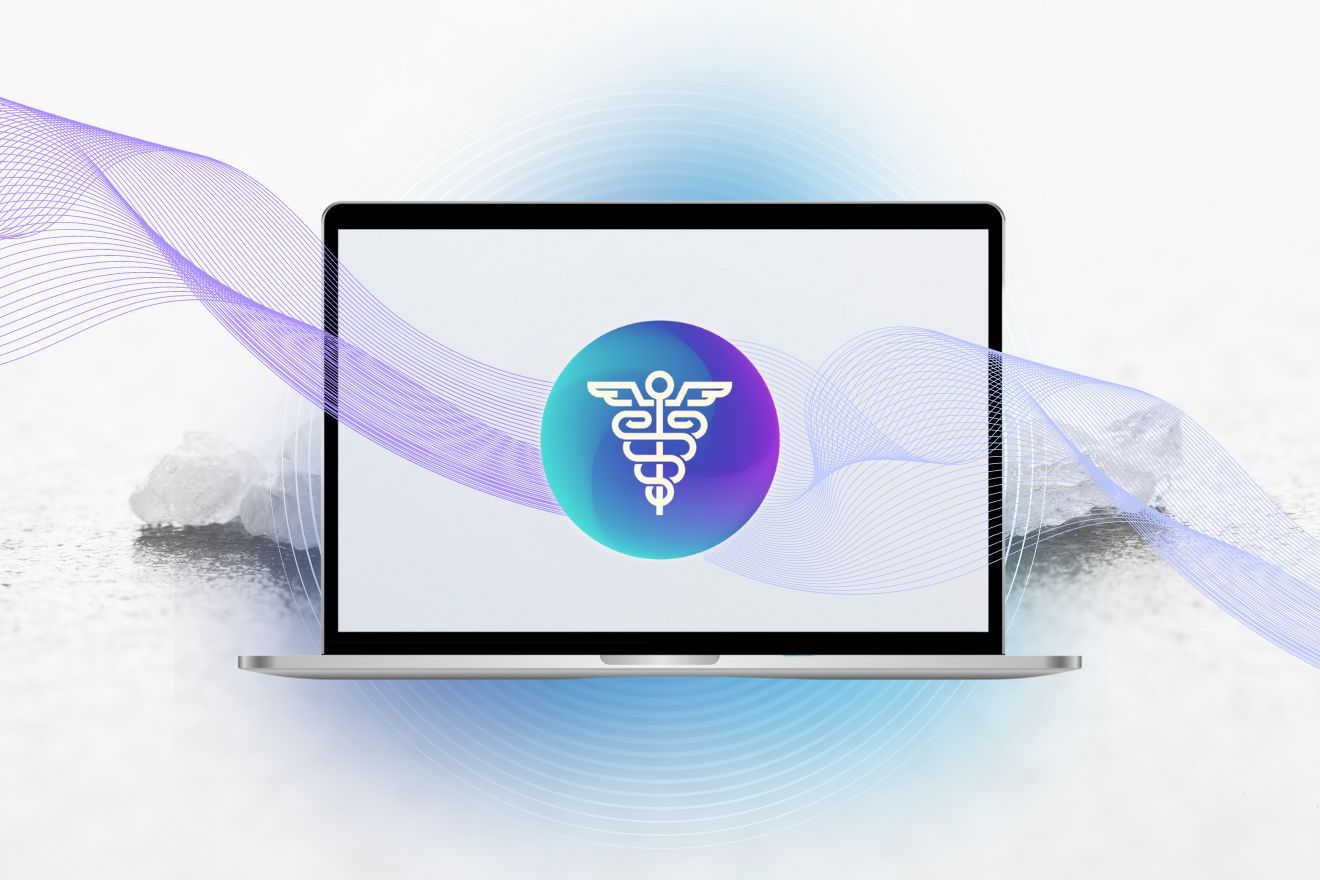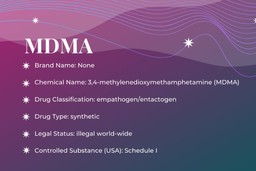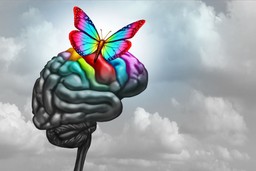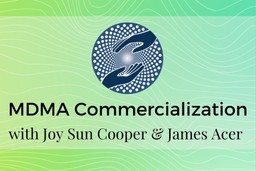The team at Psychedelic Support has written many articles about MDMA. We pride ourselves on staying current with the most up-to-date and accurate information on psychedelic research. Our library continually expands and becomes more robust each month. We have created this list of top articles about MDMA to help you navigate our growing number of resources.
First, let’s briefly look at MDMA, its history, uses, benefits, risks, and legality.
MDMA, which stands for 3,4-methylenedioxymethamphetamine, is a synthetic drug that alters mood and perception. It is chemically similar to both stimulants and hallucinogens. MDMA is categorized as an entactogen, not as a classical psychedelic.
When taken, MDMA produces feelings of increased energy, pleasure, emotional warmth, and distorted sensory and time perception. MDMA is commonly known as ecstasy but is also referred to as “molly” when sold in its pure crystalline form.
History of MDMA
MDMA was first synthesized in 1912 by the pharmaceutical company Merck. It was initially developed to control bleeding, but its psychoactive effects went largely unnoticed until the 1970s when chemist Sasha Shulgin synthesized the compound in his home laboratory and dosed himself. In the late 1970s to early 80s, MDMA was used during couple’s therapy but was not formally tested in clincial research trials. In the following decades, MDMA gained popularity as a recreational drug, particularly in party and music festival settings.
MDMA Uses
MDMA is not approved for medical use in the United States, but it has been studied for its potential therapeutic effects. Several clinical trials have explored its use in conjunction with psychotherapy for conditions such as post-traumatic stress disorder (PTSD) and anxiety in life-threatening illnesses. The drug’s ability to enhance feelings of empathy and connection has contributed to its exploration as a tool in therapeutic settings.
MDMA Benefits, Risks, and Legality
Research suggests that MDMA may have therapeutic benefits, especially when used in conjunction with psychotherapy. Studies have indicated its potential to reduce symptoms of PTSD and improve the therapeutic process by promoting trust and emotional openness between individuals and their therapists.
MDMA use is also associated with several risks. Short-term effects can include nausea, chills, sweating, muscle cramping, blurred vision, and teeth clenching. High doses or use in certain environments can lead to severe dehydration, hyperthermia, and electrolyte imbalances, which can be life-threatening.
Moreover, the illegal production and distribution of MDMA often result in varying levels of purity. There is also the risk of contamination with other substances.
As with any substance, it’s important to be aware of the legal status of MDMA in your jurisdiction and to use caution when considering its use. If you have specific questions or concerns, we advise you to consult with a healthcare professional.
1. Where Does MDMA Come From?
Let’s take a trip back in time. This one of our articles about MDMA shares an interesting story about how MDMA originated. Most people may not know this, but MDMA wasn’t created for medical advancements in warfare but for pharmaceutical competition.
It delves into when people started using the substance and why it was made illegal in the US. This history lesson is well worth the read to understand the complicated background behind MDMA.
Learn About Where MDMA Came From
2. MDMA Assisted Therapy Guide
Prior to the criminalization of MDMA, it was popular among some psychiatrists as a therapy tool. Unfortunately, no clinical trials were conducted before the ban. Many years later, the first FDA-approved study on MDMA in human subjects occurred in 1992.
This article provides a comprehensive guide to everything you need to know about MDMA-assisted therapy. It described in detail the three distinct therapy phases, including preparation, the acute MDMA experience, and integration. It summarizes the current clinical trial findings. This includes reported benefits such as improved relationships and well-being, better sleep quality, and post-traumatic growth.
The guide includes a couple of easy-to-understand YouTube videos on what MDMA does to your brain. It describes the positive and negative effects, potentially significant drug-drug interactions with MDMA, and psychotherapeutic applications. Lastly, MDMA patient and therapist testimonials are provided to help you understand the personal experiences of this substance.
Dive Into Our MDMA-Assisted Therapy Guide
3. MDMA Minus the Toxicity: Supplements to Reduce the Risks
As mentioned, several side effects can occur when taking MDMA. These health risks at large doses may include neurotoxicity, which can cause oxidative stress on your nervous system. However, there are ways to help reduce the risks.
In this article by Dr Erica Zelfand, it provides a list of supplements you can take to reduce oxidation. These include antioxidants alpha lipoic acid, acetyl-L-carnitine, N-acetyl cysteine, and ascorbic acid. It provides the evidence and research to explain the mechanisms behind their protective effects and how they can help.
Be Sure to Read About Supplements to Reduce MDMA Toxicity
4. When Can I Get MDMA Therapy?
Studies have shown MDMA therapy to be effective and valuable in patients with PTSD. However, a couple of milestones need to be reached before becoming a widely available FDA-approved medication.
Joy Sun Cooper and James Acer from MAPS Public Benefit Corporation (MAPS PBC), now renamed Lykos Therapeutics, discuss where MDMA therapy is now and what it will look like for patients and clinicians. They also answer questions about insurance coverage, off-label uses, how the VA may be involved, and how the delivery model will compare to research studies. After two phase III clinical trials were completed, a New Drug Application for MDMA-assisted therapy for the treatment of PTSD was submitted to the FDA in late 2023, which is anticipated to lead to FDA approval in the next year or two.
Learn the Latest on When People Can Get MDMA Treatment
5. Why MDMA & Other Psychedelic Therapies May NOT Work for You (Part 1 of 2)
Psychedelic therapy is not a cure-all for mental health conditions. It’s crucial you understand that it may not work for you. This article reveals the most significant factor in determining the effectiveness of a person’s psychedelic session, which is their capacity for dissociation.
Dissociation is an involuntary emotional and physical numbing response that our body uses as a defense structure. Psychedelics, by nature, cannot break down dissociation. The author, Saj Razvi, LPC, who has been involved in MDMA research, gives a specific example of MDMA not working due to the body’s numbing response.
Read About Dissociation and MDMA Therapy
6. MDMA Therapy for PTSD
The clinical evidence that supports MDMA therapy for PTSD is growing. It is estimated that PTSD affects 13 million Americans. This one of our articles about MDMA breaks down the mechanisms that explain how MDMA therapy is used in treating PTSD and describes the studies that the public benefit corporation MAPS (PBC) is conducting. It explains how MDMA therapy for PTSD is administered in clinical trials, emphasizing the importance of the setting.
Explore MDMA Therapy for PTSD
7. MDMA Could Revolutionize Care for Trauma, a Social Worker’s Perspective
Courtney Hutchison, LSW, MPH, is a social worker and psychotherapist who has worked with many clients who suffered from the repercussions of trauma, including experiences of abuse, neglect, and discrimination.
Courtney shares her first-hand experience of helping clients heal from trauma. She also shares her thoughts on a study that looked at MDMA-assisted psychotherapy as a breakthrough treatment. The findings from this study inspired Courtney to publish an article about why mental health professionals are in dire need of better treatment for PTSD and how MDMA-assisted psychotherapy works.
Delve Into Courtney’s Story
8. Can Psychedelic Therapy Help to Improve Sexual Function?
Currently, there aren’t many clinical trials looking at psychedelic therapy and sexual function. However, psychedelics are shown to be effective in treating depression, anxiety, and PTSD.
Of our articles about MDMA, this one explores how psychedelics could be a helpful tool in sex and couples therapy. Specifically, one of MDMA’s effects is an increased feeling of closeness with others and connection. For this reason, it may help couples become more vulnerable with each other. It also suggests MDMA may be beneficial in healing sexual trauma.
Read More About MDMA and Sexual Function
9. Relationships: Therapists, Friends, Lovers, and Beyond
Sometimes we get lost in the data and scientific research and forget about the deep human connection that psychedelics can help spur. MDMA is an entactogen which means it helps with social openness, empathy, social communion, and oneness, among others.
Dr. Lincoln Stoller writes about how the role of MDMA can help in understanding boundaries and healing relationships, such as those between friends, lovers, family members, and the one between a patient and their therapist. Dr. Stoller recounts listening to a woman share her story of encouraging her entire family to take MDMA over the Christmas holidays. The impact of this experience not only relieved her family’s stress at the time but enhanced their love for one another.
Find Out About MDMA and Relationships
10. First Clinical Trial: Social Anxiety in Autistic Adults Successfully Treated with MDMA Therapy
Autistic adults commonly suffer from severe social anxiety. Dr. Allison Feduccia, Co-Founder of Psychedelic Support, details the findings of the first clinical trial that investigated MDMA therapy among adults on the autism spectrum.
Specifically, it showed that MDMA therapy may help reduce symptoms that limit social adaptability and often affect quality of life. It provides a summary of the results as well as what the future holds for this type of research.
Learn More About MDMA Therapy and Autism
Therefore, the perception of this “party drug” is transforming as more clinical studies are conducted and their results are published. We aim to stay on top of the leading research and will continue to share with you as the evidence unfolds.
















